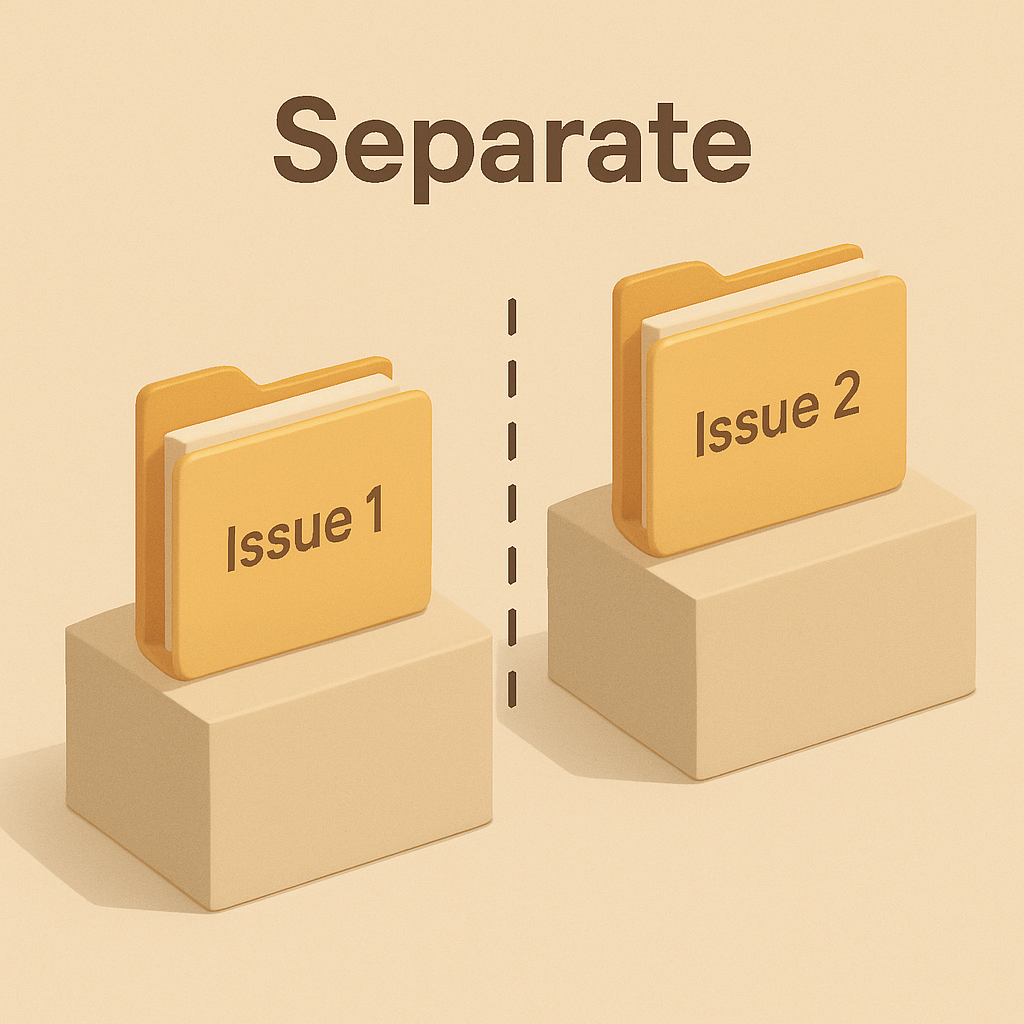Separate
Definition
The word "separate" means to divide or set apart from others (verb) or describes something distinct or unconnected (adjective).
Parts of Speech
- Verb
- Adjective
Pronunciation
American English
- IPA Pronunciation (verb): /ˈsɛp.əˌreɪt/
- Respelling (verb): SEP-uh-rayt
- IPA Pronunciation (adjective): /ˈsɛp.ər.ɪt/
- Respelling (adjective): SEP-uh-rit
British English
- IPA Pronunciation (verb): /ˈsɛp.əˌreɪt/
- Respelling (verb): SEP-uh-rayt
- IPA Pronunciation (adjective): /ˈsɛp.ər.ɪt/
- Respelling (adjective): SEP-uh-rit
Etymology
The word "separate" originates from the Latin "separatus," the past participle of "separare," meaning "to divide, distinguish, or set apart." It is derived from "se-" (apart) and "parare" (to prepare). The term entered Middle English in the 15th century.
Derivatives
- Separation (noun)
- Separately (adverb)
- Separator (noun)
- Separability (noun)
- Inseparable (adjective)
Synonyms
- Divide
- Detach
- Isolate
Antonyms
- Join
- Unite
- Combine
Usage
The term "separate" is widely used in contexts involving division, distinction, or disconnection. Examples include: "They decided to separate their business interests," and "The report is divided into separate sections."
Related Terms
- Division: The act of separating into parts.
- Distinct: Clearly different or separate.
- Isolation: The state of being set apart or alone.
Detailed Definitions
Verb
- To divide or set apart: Refers to the act of creating a distinction or barrier between two or more things.
- Example: "She separated the clothes into piles."
- To end a connection or relationship: Refers to breaking ties or disassociating.
- Example: "The two companies separated after the merger failed."
Adjective
- Distinct or unconnected: Describes things that are not joined or related.
- Example: "The two issues are completely separate."
- Existing independently: Describes something functioning alone or individually.
- Example: "Each department has its own separate budget."
separate



🇨🇳 Mandarin
- 分开 (fēnkāi) - Separate (to stop being together)
- IPA: [fə́n.kʰái]
- Respelling: fen-khai
- 分离 (fēnlí) - Separate (to move or be apart)
- IPA: [fə́n.lǐ]
- Respelling: fen-lee
🇮🇳 Hindi
- अलग (alag) - Separate (to stop being together)
- IPA: [ələg]
- Respelling: a-lag
- पृथक (prithak) - Separate (to move or be apart)
- IPA: [pɾɪthək]
- Respelling: pri-thak
🇪🇸 Spanish
- Separar - Separate (to stop being together)
- IPA: [sepaˈɾaɾ]
- Respelling: se-pa-rar
- Apartar - Separate (to move or be apart)
- IPA: [apaɾˈtaɾ]
- Respelling: a-par-tar
🇫🇷 French
- Séparer - Separate (to stop being together)
- IPA: [sepaʁe]
- Respelling: se-pa-re
- Distinguer - Separate (to move or be apart)
- IPA: [dɛ̃stɛ̃ɡe]
- Respelling: din-stin-ge
🇦🇪 Modern Standard Arabic
- فصل (fasala) - Separate (to stop being together)
- IPA: [fasala]
- Respelling: fa-sa-la
- عزل (azala) - Separate (to move or be apart)
- IPA: [ʕazala]
- Respelling: aza-la
🇧🇩 Bengali
- পৃথক (prithak) - Separate (to stop being together)
- IPA: [pritʰɔk]
- Respelling: pri-thok
- বিচ্ছেদ (bicched) - Separate (to move or be apart)
- IPA: [bit͡ʃʰed̪]
- Respelling: bi-chhed
🇷🇺 Russian
- Разделить (Razdelit') - Separate (to stop being together)
- IPA: [rɐzdʲɪˈlʲitʲ]
- Respelling: raz-di-lit
- Отделить (Otdelit') - Separate (to move or be apart)
- IPA: [ɐtdʲɪˈlʲitʲ]
- Respelling: ot-di-lit
🇵🇹 Portuguese
- Separar - Separate (to stop being together)
- IPA: [sɨpɐˈɾaɾ]
- Respelling: se-pa-rar
- Apartar - Separate (to move or be apart)
- IPA: [ɐpɐɾˈtaɾ]
- Respelling: a-par-tar
🇮🇩 Indonesian
- Pisahkan - Separate (to stop being together)
- IPA: [pisaɦan]
- Respelling: pi-sa-han
- Memisahkan - Separate (to move or be apart)
- IPA: [məmisaɦan]
- Respelling: me-mi-sa-han
🇩🇪 German
- Trennen - Separate (to stop being together)
- IPA: [ˈtʁɛnən]
- Respelling: tren-nen
- Absondern - Separate (to move or be apart)
- IPA: [apˈzɔndɐn]
- Respelling: ap-son-dern
🇯🇵 Japanese
- 分ける (Wakeru) - Separate (to stop being together)
- IPA: [wakeɾɯ]
- Respelling: wa-ke-ru
- 隔てる (Hedateru) - Separate (to move or be apart)
- IPA: [hedateɾɯ]
- Respelling: he-da-te-ru
🇻🇳 Vietnamese
- Tách - Separate (to stop being together)
- IPA: [taːk˧˥]
- Respelling: tak
- Chia cắt - Separate (to move or be apart)
- IPA: [ciə˨˩ kat˧˥]
- Respelling: chee-ya kat
🇰🇷 Korean
- 분리하다 (Bunrihada) - Separate (to stop being together)
- IPA: [bun.ɾi.ha.da]
- Respelling: bun-ri-ha-da
- 격리하다 (Gyeogrihada) - Separate (to move or be apart)
- IPA: [ɡjʌk.ɾi.ha.da]
- Respelling: gyeok-ri-ha-da
🇹🇷 Turkish
- Ayırmak - Separate (to stop being together)
- IPA: [ajɯɾˈmak]
- Respelling: a-yir-mak
- Bölme - Separate (to move or be apart)
- IPA: [bœlˈme]
- Respelling: bol-me
🇵🇰 Urdu
- الگ (Alag) - Separate (to stop being together)
- IPA: [ələg]
- Respelling: a-lag
- منقسم کرنا (Munqasim karna) - Separate (to move or be apart)
- IPA: [mʊn.qa.sɪm ˈkəɾ.na]
- Respelling: mun-qasim kar-na





